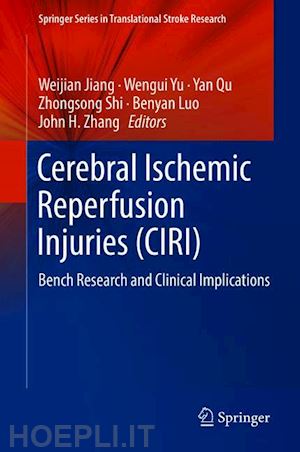
Questo prodotto usufruisce delle SPEDIZIONI GRATIS
selezionando l'opzione Corriere Veloce in fase di ordine.
Pagabile anche con Carta della cultura giovani e del merito, 18App Bonus Cultura e Carta del Docente
This volume is focused on subjects related to cerebral ischemia and reperfusion injuries after acute stroke. All chapters are selected from the Sixth Elite Stroke meeting named Pangu Stroke Conference and written by members of world leading laboratories of stroke studies. The contents cover both clinical and bench studies, from basic components of cerebral arterial system to clinical reperfusion injury cases, from reperfusion caused programmed cell death and astrocyte activation to oxidative stress and nitric oxide after reperfusion, from extracellular matrix and inflammation to a role of diabetes after reperfusion, from small artery disorders to collateral circulation and blood pressure control after reperfusion.
Wei-Jian Jiang, Chairman of New Era Stroke Care and Research Institute of PLA Rocket Force General Hospital, Beijing, China.
Wengui Yu, Professor and Director of Comprehensive Stroke & Cerebrovascular Center, University of California, Irvine
Yan Qu, Professor and Director of Neurosurgery at the Second Affiliated Hospital of Air Force Medical University, Xi’an, China.
Zhongsong Shi, Professor of Neurosurgery at Sun Yat-sen Memorial Hospital, Sun Yat-sen University, Guangzhou, China.
Ben-yan Luo, Professor and Chair of Neurology at the First Affiliated Hospital of Zhejiang University.
John H. Zhang, Professor of Anesthesiology and Physiology at Loma Linda University School of Medicine, Loma Linda, CA, USA.
Introduction
The summary of Pangu stroke meeting and overview
Lusha Tong, John H. Zhang
Chapter 1
Gelatinase-mediated Impairment of Microvascular Beds in Cerebral Ischemia and Reperfusion Injury
Shanyan Chen, Hailong Song, Jiankun Cui, Joel I. Shenker, Yujie Chen, Grace Y. Sun, Hua Feng, Zezong Gu
Chapter 2
Characters of ischemic stroke and recanalization arteries
Qingqing Dai, Shujuan Li, Junfa Li
Chapter 3
Cerebral Ischemic Reperfusion Injury (CIRI) Cases
Wei-Jian Jiang, MD, PhD; Yi-Qun Zhang
Chapter 4
CIRI after early recanalizationQingmeng Chen, MS, Min Lou, MD, PhD
Chapter 5
Programmed cell death in CIRI
Ruili Wei, Yan Xu, Jie Zhang, Benyan Luo
Chapter 6
Reactive astrocytes in cerebral ischemic reperfusion injuryAbhishek Mishra1, Rachana Nayak1, Dandan Sun1
Chapter 7
Oxidative Stress and Nitric Oxide in Cerebral Ischemic Reperfusion Injury
Junning Ma, MS; Zhong Liu, MS; Zhongsong Shi
Chapter 8
Extracellular Matrix in Stroke
Yao Yao
Chapter 9
Inflammation and Ischemic Stroke
Junwei Hao, MD, PhD, Kai Zheng, Heng Zhao, PhD
Chapter 10
Cerebral vascular injury in diabetic ischemia and reperfusion
Haibin Dai
Chapter 11
Ischemia/reperfusion damage in diabetic stroke
Poornima Venkat, PhD, Michael Chopp, PhD, Jieli Chen, MD
Chapter 12
Current understanding of pathology and therapeutic status for CADASIL
Suning Ping and Li-Ru Zhao
Chapter 13
Blood Pressure and Cerebral Ischemic Reperfusion Injury
Wei-Jian Jiang, MD, Ph.D.; Chen Li, MD, Ph.D.; Mohamad Orabi MD, Wuwei Feng
Chapter 14
Collateral circulation and cerebral ischemia reperfusion injury
Qinghai Huang, Wanling Wen
Chapter 15
Controlled Reperfusion against Ischemia Reperfusion Injury
Wei-Jian Jiang, MD, PhD; Jin Lv, PhD; Ying-Ying Zhang, PhD; Kai Wang
Chapter 16
Therapeutic Window beyond Cerebral Ischemic Reperfusion Injury
Wengui Yu, MD, PhD1 and Liping Liu, MD, PhD











Il sito utilizza cookie ed altri strumenti di tracciamento che raccolgono informazioni dal dispositivo dell’utente. Oltre ai cookie tecnici ed analitici aggregati, strettamente necessari per il funzionamento di questo sito web, previo consenso dell’utente possono essere installati cookie di profilazione e marketing e cookie dei social media. Cliccando su “Accetto tutti i cookie” saranno attivate tutte le categorie di cookie. Per accettare solo deterninate categorie di cookie, cliccare invece su “Impostazioni cookie”. Chiudendo il banner o continuando a navigare saranno installati solo cookie tecnici. Per maggiori dettagli, consultare la Cookie Policy.